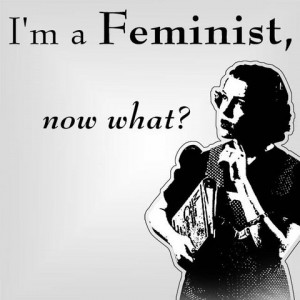When Finding Feminism Means Creating Your Own Space
 Last week, Elana Levine kicked off a new feminist media studies column here at Antenna with poignant thoughts about re-centering the focus on social struggle in our investigation of media and culture. Pointing to the development of postfeminist perspectives and masculinist discourses of legitimization, Levine raised apt questions about the potential displacement of feminist concerns in media studies. As a graduate student and young scholar in the midst of developing my own research agenda and learning to navigate the intersectional nature of my identity, my research interests, and this lifestyle we call the academic profession, Levine’s introduction to Antenna’s feminist media studies column resonated strongly with me, particularly the notion that “feminism is not just an approach one might take. It’s kind of the point.”
Last week, Elana Levine kicked off a new feminist media studies column here at Antenna with poignant thoughts about re-centering the focus on social struggle in our investigation of media and culture. Pointing to the development of postfeminist perspectives and masculinist discourses of legitimization, Levine raised apt questions about the potential displacement of feminist concerns in media studies. As a graduate student and young scholar in the midst of developing my own research agenda and learning to navigate the intersectional nature of my identity, my research interests, and this lifestyle we call the academic profession, Levine’s introduction to Antenna’s feminist media studies column resonated strongly with me, particularly the notion that “feminism is not just an approach one might take. It’s kind of the point.”
I was asked to contribute to this new column a piece about co-founding the Feminist Media Studies Collective here at UW-Madison, a reading/writing group that Mary Beltran and I started last spring. Like every department experiences at one point or another, the Media & Cultural Studies program here at UW was in a stage of extended transition; just as we were hiring new faculty, others were announcing their departure – including Mary, my advisor. Amid this transition, the need for a consistent space to sustain scholarly attention to identity, gender, and media in our department became apparent. Mary and I decided to do more than just discuss the need for such a space – we created one.
We envisioned the UW Feminist Media Studies Collective as a reading group that could foster discussions about studying the intersectional nature of social power and negotiating such struggles in our own daily lives, including conversations about scholarship, teaching, and pedagogy. In addition, we wanted a place where members could share and receive feedback on each other’s work in a way that encouraged questions and new perspectives. With monthly meetings, the Feminist Media Studies Collective would provide an important supplementary space that could maintain the visibility of feminism in media studies. Our mission in starting such a group was more than just recognizing the place of feminism in media studies – our mission was also to enact the feminist practice of community building, consciousness raising, and claiming one’s space from which to speak. In other words, starting a UW Feminist Media Studies Collective was not just about feminism “as an approach one might take,” as Levine said, but feminism “was kind of the point” all together.
Now in its first full year, the Collective is starting to get off the ground. We’ve met and discussed topics ranging from postfeminism to gendered labor practices in academia. Open to everyone in the department, our meetings have brought together a range of graduate students and department faculty. As well as valuable dialogue, the Collective has also enabled many beneficial moments of mentorship among peers. Although sometimes I admittedly worry that the Collective might unintentionally isolate feminist media studies as an approach, it’s certainly meeting Mary’s and my goals to ensure a space where it can continue to inform media studies as a whole. So far, the Collective is functioning as an important space that reinvigorates a focus on identity and social power that we then take back to broader conversations, whether they are in coursework or at conferences.
In sharing my experience with the UW Feminist Media Studies Collective, I hope to share ideas and sentiment about the importance of feminism in media studies. I also share this experience to remind us that no matter who we are or where we are in our careers, we can each make a difference. In no way do I discount the existence of larger, structural inequalities and the need for wide-ranging change, but sometimes we forget that our immediate surroundings are important places where we can actually bring change to life. Perhaps I am just a young idealist stubbornly maintaining hope in our ability to make a better world, but to me, there is just too much at stake for us to forget that even at some small level, each of us can do something.
I share this experience, too, to say that our field remains a powerful political site, even for those of us who maybe didn’t identify as a feminist first and a media scholar later, as Levine & Nina Huntemann put it. I was raised by a single, working mother who – as one of the few successful women able to carve out a career in the male-dominated field of hotel construction – served as a powerful role model for achievement and equality. But I didn’t identify as a feminist until my undergraduate years as a Radio-TV-Film major at UT-Austin, when I took my first feminist media studies class: the Senior Fellows honors course, “Women, Feminism, and Media,” taught by Sharon Marie Ross.  It’s no exaggeration to say that Ross’s class changed my life; reading Angela McRobbie, Julie D’Acci, Patricia Hill Collins, and Judith Butler for the first time put so many familiar media experiences (watching Cagney & Lacey, Murphy Brown, & Designing Women with my mother, always imagining my future as woman who wore a suit, feeling totally inadequate reading Seventeen magazine) into a completely new perspective that made so much sense. It was like going to the optometrist when you thought your vision was fine, but putting your face on that machine and discovering there was a lens that made everything so much clearer. I had taken other media studies classes in the RTF major, but Ross’s class offered a crucial space for me to understand and develop my feminist sensibility, to take that lens and see the rest of my world through it.
It’s no exaggeration to say that Ross’s class changed my life; reading Angela McRobbie, Julie D’Acci, Patricia Hill Collins, and Judith Butler for the first time put so many familiar media experiences (watching Cagney & Lacey, Murphy Brown, & Designing Women with my mother, always imagining my future as woman who wore a suit, feeling totally inadequate reading Seventeen magazine) into a completely new perspective that made so much sense. It was like going to the optometrist when you thought your vision was fine, but putting your face on that machine and discovering there was a lens that made everything so much clearer. I had taken other media studies classes in the RTF major, but Ross’s class offered a crucial space for me to understand and develop my feminist sensibility, to take that lens and see the rest of my world through it.
Though I spent five years working in the advertising and communications industry after college, that feminist lens is what brought me back to graduate school. This lens isn’t something I can take on or off – it informs my entire worldview. It’s a worldview that values social, political, and economic equality for all people; a worldview that believes in consciousness-raising and community building, that believes in the power of everyday life as an activist space and the need to enact agency and take up spaces from which marginalized voices can be heard. I wholeheartedly agree with Levine that choosing a career focused on the study of media as a site of cultural struggle is itself a feminist act. I often look to my research and teaching as the ways I put my politics into practice, but “practicing feminist politics” can be more than just research and writing. Finding the feminism in media studies can sometimes also mean finding feminism in ourselves and enacting our own agency to make change, no matter how small it may seem.



So great to hear about this, Lindsay, and I appreciate your recognition of the irony of establishing a “separate” space for feminism within a field that I, at least, am arguing was once, if not still, fundamentally feminist itself. And I’m totally with you in the experience of media studies helping one’s latent feminism to emerge–happened to me and I’ve seen it happen with students time and again.
Great post, Lindsay. I think this work of making feminist scholarship visible is very important, but what I see in the Feminist Media Studies Collective is just as crucial to supporting feminist scholarship, and that is the sense of solidarity this collective fosters. You highlight the importance of individual agency in practicing feminist politics, equally important is the ability to practice feminism in concert with others, which for me is one of the strengths of a feminist media group. Thank you for your awesome mentorship, and for forging this space for feminists media scholars to gather and support each other so that we may share our work and perspectives with the greater world and its feminist (and non-feminst) spaces.